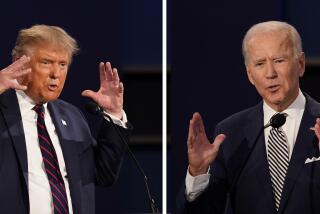SHULTZ-GROMYKO TALKS : NETWORKS DEFEND MAJOR COVERAGE
- Share via
NEW YORK — There were times this week when it seemed like the highest-paid broadcast journalists in the world were nothing but glorified weathermen covering the cold snap in Geneva.
All the big TV news names have been in Geneva for the Shultz-Gromyko arms talks--or rather, the prelude to what may become arms talks. Dan Rather, Tom Brokaw, Peter Jennings, John Chancellor, Bill Moyers, Marvin Kalb, Bryant Gumbel, Steve Bell and many more have converged on the sleepy town of Geneva--Switzerland doesn’t have any other kind--and they have spent a lot of air time talking about the cold weather instead of the cold war.
The networks have spent big bucks financing this winter trip. Is it a case of media overkill?
No, said Ed Joyce, president of CBS News.
“The issue of nuclear disarmament certainly leads the list of important issues of our time,” Joyce said. “After several years of chilled relations between the Soviets and the United States, meetings of this nature are of critical importance.
“They deserve comprehensive coverage, even with the knowledge in advance that nothing more may come of them than an agreement to hold future meetings.”
Steve Friedman, executive producer of NBC’s “Today” show, agreed, and he was echoed by a spokeswoman for ABC News whose network had just been the only one to carry live Secretary of State George Shultz’s Tuesday afternoon announcement of future arms talks.
“You don’t know what’s happening on a story until you get there,” Friedman said. “We went to an economic summit one time and meantime Lebanon was invaded. On the other hand, it was on our air, when Bryant Gumbel was in Russia, that the Soviets announced they would be willing to talk to us.
“People in the United States and in Russia say there’s no bigger issue in our lifetime than arms control, and this is where the process begins. The fact that at first no one would talk to us and tell us what was going on is beside the point. To feel the atmosphere, you’ve got to be there.”
There are two other aspects to all this.
“It’s the beginning of a new year,” Friedman said. “People have new budgets.”
He also pointed out that Jennings, Rather and Brokaw are reporters and belong where the story is happening.
The ABC spokeswoman did not agree on the budget.
“Granted that it’s the beginning of the budget year,” she said, “but this is an expensive proposition. We don’t blow the budget for the year unless it’s important. I don’t think that’s a major consideration.”
She said being able to cover--live--Shultz’s announcement of further talks embodied the reason for being in Geneva.
If you thought the network evening newscasts devoted a lot of time Monday night to Geneva, even though they had nothing newsworthy to report, you are correct. CBS devoted about 17 1/2 minutes to Geneva, NBC gave it 14 minutes and ABC 13 minutes.
Tuesday night, although there was news of future talks to report and Shultz made himself available to the networks, the figures were about 10 minutes for CBS, 14 minutes for NBC and about 9 minutes for ABC.
It should be pointed out that Monday night was what we call in the news business a slow news day. Tuesday was a busy news day, what with a White House shakeup, a flap about non-union labor involved in the Inaugural, Ted Kennedy in South Africa and the 50th anniversary of Elvis Presley’s birth.
The networks say that an important decision was made to hold future arms talks--and you were there. On the other hand, once you’ve said that, you’ve said it all.
More to Read
The complete guide to home viewing
Get Screen Gab for everything about the TV shows and streaming movies everyone’s talking about.
You may occasionally receive promotional content from the Los Angeles Times.






